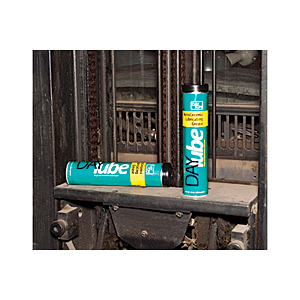Lubricants keep the beverage industry running
The beverage industry often relies on lubricants to keep its machines running smoothly. With so many different types of operations going on in the beverage supply chain — from conveying systems to filler machines to can seaming and closing machines all in a washdown environment — gear oils, food grade seamer oils, high- and low-temperature greases, assembly pastes and more are all called into action to lubricate the system, says Toby Porter, food market manager of Londonderry, N.H.-based Klüber Lubrication.

|
| To promote sustainability, Dayton, Ohio-based Dayton Production Corp. released its DayLube synthetic lubricant, a high-performance grease that contains nanoceramic particles that act as sub-microscopic ball bearings to provide continuous lubrication to steel surfaces. |
“Lubricants in a beverage facility, similar to other markets, are used to prolong the life of machinery components,” Porter says. “When two interacting surfaces are not properly protected from excessive wear, the result can be unnecessary and sometimes unexpected maintenance costs.”
Lubricants can ease more than just the grinding of the gears, explains Scott Smith, vice president of marketing and development for Greenville, S.C.-based Hartness International Inc. “When you have a lot of bottles on a packaging line, the sheer mass of them moving together can create a lot of bottle-to-bottle pressure. The chain running underneath them drives them forward but it drives them into one another, so it can create product damage, it can create bottles that fall over, and you get a lot of pressure,” he says. This product damage is most apparent recently because of the packaging trend toward using light-weight containers that do not offer as much product protection, he adds. Lubricants can help protect against this product damage by oiling the conveyor chain and driving the bottles in a swift motion, Smith says.
In addition to keeping machine parts gliding swiftly against each other and the products they come in contact with, beverage-makers have to keep in mind the potential for incidental contact with the consumer packaged goods they produce. According to Jim Girard, vice president and chief marketing officer of Toledo, Ohio-based Lubriplate Lubricants Co., most beverage-makers are converting to food-grade oils to reduce potential contamination hazards.
If beverage-makers commit to a 100 percent National Sanitation Foundation (NSF) H1-registered food-grade lubricants program, the U.S. Food and Drug Administration does not require the operation to have a Hazard Analysis and Critical Control Points (HACCP) plan, because the lubricants are no longer considered chemical contaminants, Girard explains. Furthermore, to prevent bacteria and mold growth, beverage-makers are constantly washing down their machines, and food grade lubricants are resistant to these wash-down methods, he adds.
In addition to the health of beverage consumers, beverage-makers and lubricant manufacturers also worry about sustainability and the health of the environment. For this reason, many beverage-makers are turning to synthetic lubricants, Lubriplate’s Girard notes. “They are frequently eco-responsible because they last longer, there’s less waste disposal, and many of them are, in fact, biodegradable,” he says.
To promote sustainability, Dayton, Ohio-based Dayton Production Corp. released this year its DayLube synthetic lubricant for conveyors and their bearings, chains, gears, lifters, machine parts, robotics, slides, wear plates, lift trucks and other material handling devices. This high-performance grease contains nanoceramic particles that act as sub-microscopic ball bearings to provide continuous lubrication to steel surfaces, the company says. DayLube has high load-bearing properties, a low dielectric constant, does not contain metal or silicone and is resistant to steam, acids and most chemical products, it says. Plus, it is very durable and in tests performed through 100,000 production strokes without breaking down or softening, it adds.
In addition to durability, synthetic lubricants also allow for higher production speeds, Klüber’s Porter says. “With new machinery being developed that can work at a quicker pace and for longer periods [of time], this also can result in a higher strain on individual components,” he says. “The inevitable outcome is a demand for higher performance lubricants that can keep up with the production that the market is demanding.” Plus, because synthetic lubricants last longer, they need to be changed less often, which results in less production downtime for this changeover, fewer man hours and decreased maintenance costs, he adds.
To provide these benefits, Klüber offers Klüberfood NH1 94-6000, a synthetic fluid gear grease. The NSF H1-registered lubricant is based on a combination of highly refined synthetic hydrocarbon and a special calcium complex soap thickener, which allows it to function in refrigerated environments, the company says. The grease provides corrosion protection, water resistance and wear protection even at the very soft consistency of National Lubricating Grease Institute (NLGI) 000, it says. It also can reduce the wear on gears and extend maintenance intervals due to its load-carrying capacity and corrosion protection, it adds.
A new option in sustainable lubricants is the use of dry lubricants like Livingston, Scotland-based Specialist Lubricants Ltd.’s RM2000T. Introduced in the United States in 2004, the product still is developing its presence in the market in comparison to water-based lubricants, says Charles Brunton, managing director and chief executive officer of Specialist Lubricants. RM2000T is a non-aqueous blend of oil with PTFE particles that is food-safe, cannot support bacterial life, and does not use water, allowing the user to save resources, Brunton says. It also does not coagulate or block, can offer as much as an 8 percent production increase compared with water-based lubricants, and does not need to be changed, he adds. BI
Looking for a reprint of this article?
From high-res PDFs to custom plaques, order your copy today!






